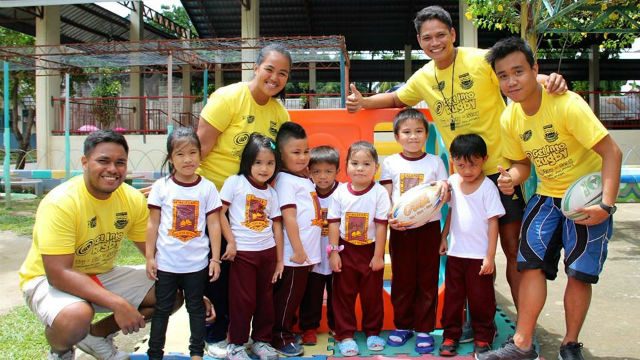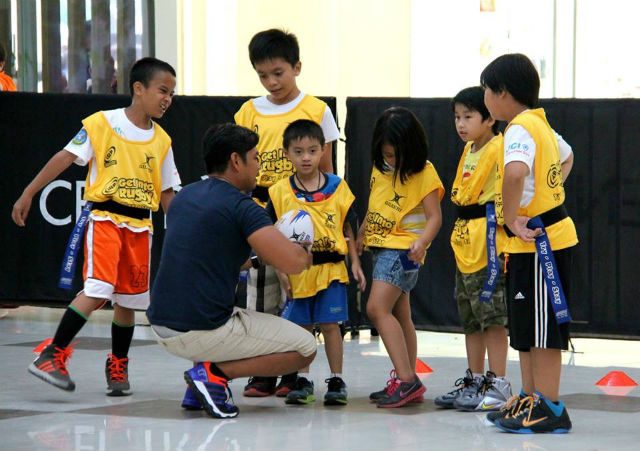SUMMARY
This is AI generated summarization, which may have errors. For context, always refer to the full article.

MANILA, Philippines – As a Filipino-born kid, I had never imagined playing rugby until my family permanently transferred to the United Kingdom when I was 8-years-old.
Growing up in the country where rugby football was born, I learned and played the sport just like any kid in that part of the world. Though I had never played professionally, I was a part of my school’s rugby football teams at Bishop’s Stortford Boys High School, as well as St. Mary’s Catholic School. I would say that was the start of my love affair with the sport.
In September 2011, I decided to visit my birth place, the Philippines, after 29 years in the UK. When I learned that my home country had a National Rugby Team called the Philippine Volcanoes. I trained with some of them at the Ultra Sports Complex in Manila until I found myself helping out in conducting free rugby clinics.
After being just a spectator in rugby games during my working years, I got hooked on the sport again. My passion for the sport turned more meaningful after I volunteered to visit the New Bilibid Prison, a maximum security prison in Manila, through the invitation of the previous Philippine Volcanoes Coach Esposito Mejia and had the opportunity to teach the inmates touch rugby as a form of character and confidence building.
I found the experience very fulfilling and realized something: that rugby can actually influence people and their outlook and attitude in life. At least that was very true for me and so my momentous journey with rugby kicked off that day.
It was in 2013 when I moved to the City of Cagayan de Oro in the southern part of the Philippines that my rugby life turned into full speed.
Without anyone to play with as the sport has never been played in this part of the country, I decided to create my own rugby club, now known as the Cagayan de Oro Rugby Football Club (CDO RFC) and started to recruit and train players initially for seniors (over 16 age group) and later included ladies, juniors (U16s) and minis (U10’s).
Considering what I have started with CDO RFC, I was then hired as a Regional Rugby Development Officer by the Philippine Rugby Football Union (PRFU), the official governing body of the sport of Rugby Union in the Philippines, to handle development efforts in Northern Mindanao.
But what I am most proud of is the Club’s advocacy, “Help Change the Life of a Child” or HCLC, our social responsibility program centered towards using sports therapy through rugby as an essential tool in shaping a child’s outlook towards life to become better members of the community.
The Club has visited several schools including Boys Town, a shelter for young boys in Lumbia, Cagayan de Oro City, for our HCLC program using the Get Into Rugby platform, introducing the sport as a form of therapy, conducted in a fun and exciting way.

These sessions also aims to teach kids as well as our own players to learn about teamwork, passion and sense of purpose. In 2014, CDO RFC has conducted GIR to the most number of kids in the Philippines and even initiated the first ever GIR conducted in a shopping mall.
In the same year, CDO RFC Senior players debuted and won gold in the shield division of the Philippine National Games held in Manila and the junior players were able to compete for the first time in the Philippine Youth Games, both of which are great accomplishments after training for only a few months.
That year also marked the first ever Rugby Festival in the City of Cagayan de Oro as my way of letting the locals watch a live rugby game. I used quad media (TV, radio, print and social media) to recruit and spread the word about rugby and later on, the players and their parents, friends and family members did the recruitment and marketing for me.
To ensure that rugby development continues within my regional jurisdiction, I trained some of our players to become coaches themselves and help me grow the sport. Our humble club started with just myself until it grew into around 80 players of all ages and over 3,000 friends and followers on Facebook including parents, partners and sponsors who are all part of our rugby family.
Fast forward to late 2015, I was chosen as guest speaker at a World Rugby Convention held in Manila where I told the story of my rugby journey in the Philippines. I was also chosen as one of the two delegates from the Philippines who recently travelled to Vietnam to learn about the Pass it Back program, an innovative Sport for Development program using rugby to equip children and young people in a dynamic Asia to overcome challenges, inspire positive social change and ‘pass it back’ to their communities.
I believe that this program has a similar goal as what CDO RFC does and that is to help an individual particularly youngsters into better members of the community and to create a positive change and inspire others through sports.
According to Pass it Back, there are more than one billion young people under the age of 24 living in communities that have limited access to quality, safe and organized sports participation opportunities that are part of 11 identified Pass it Back countries, the Philippines included.
In Cagayan de Oro City for instance, I would say that majority of the children have limited access or no access at all to organized sport and its benefits. In certain areas where there are opportunities, Pass it Back cited that barriers affect participation disproportionately for girls and young women.
Poverty, violence, early marriage, poor health and hygiene and household responsibilities have all been identified as barriers to participation.
I have been thinking of innovative ways to create awareness for the sport by partnering with various organizations doing community outreach programs. Apart from HCLC, CDO RFC also initiated other social responsibility projects starting in 2014 such as “Give Blood, Play Rugby”, blood-letting drive in partnership with the Philippine Red Cross – Cagayan and Misamis Oriental Chapter, “Think Green”, a branding initiative for tree-planting activities of our partners which CDO RFC is supporting.
For my 40th birthday last December 2015, I decided to visit the kids of Boys Town and surprise them with treats and snacks on Christmas Day!
I would like to believe that 2016 would be a better year for rugby development in the Philippines especially that the Philippine Volcanoes (Men’s Team) has won gold and the Lady Volcanoes got bronze in the 2015 South East Asian Games (SEA Games). Rugby Unions in different countries have likewise grown the sport with the help and support of World Rugby, producing more coaches and thereby grooming more players.
The sport of Rugby will even get more exposure with its debut in the 2016 Summer Olympics which can be used by Rugby Unions around the world as a leverage to widen grassroots development programs. With rugby expected to grow exponentially after the upcoming Olympics, the sport could truly become global and hopefully become one of the mainstream sports, enjoyed by everyone across all ages and genders.
While CDO RFC will capitalize on these positive global developments, the club would also like to include another global icon to the Rugby community in the person of Ms. Pia Wurtzbach, the reigning 2015 Miss Universe who happens to be from Cagayan de Oro City, to create awareness for rugby, especially for girls and women.
Early this year, CDO RFC invited Ms. Wurtzbach through her Facebook Page and Twitter account to possibly grace a local Rugby for Girls event that we plan to hold during her homecoming. If Ms. Wurtzbach accepts our invitation, it would be such a huge opportunity to inspire girls around the world to play rugby and change their perception of the sport as a highly physical one as well as provide an option for girls to try a different sport for physical fitness.
If a real prince such as Prince Harry can play with boys and girls in Durban, South Africa, then surely our very own Queen can at her home turf.
Help us spread the sport of rugby to more kids in the Philippines. Send us an email to cdorugbyclub@gmail.com or like our Facebook page: https://www.facebook.com/cdorugbyclub and send us a personal message. Thank you all. – Rappler.com
Rugby is a highly physical game so it’s important to play it with proper equipment. Check out deals on rugby equipment here.
Add a comment
How does this make you feel?
There are no comments yet. Add your comment to start the conversation.